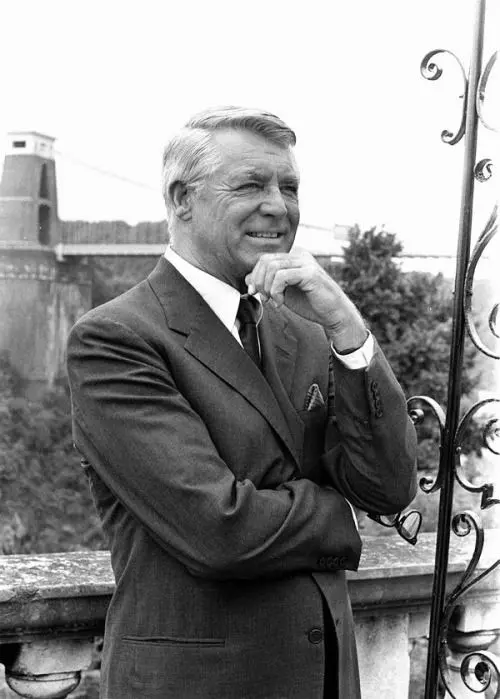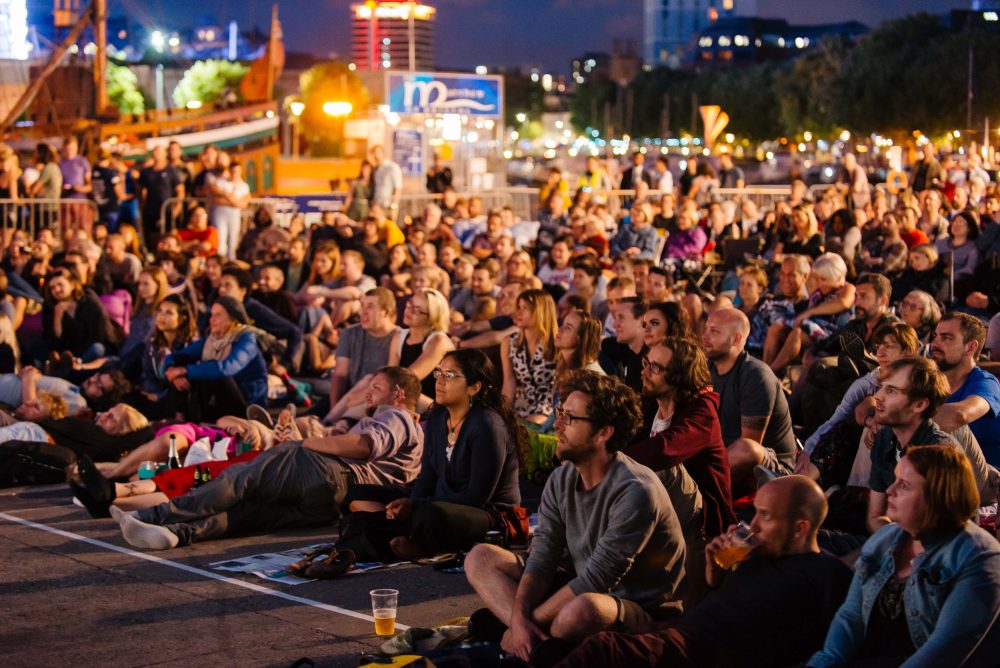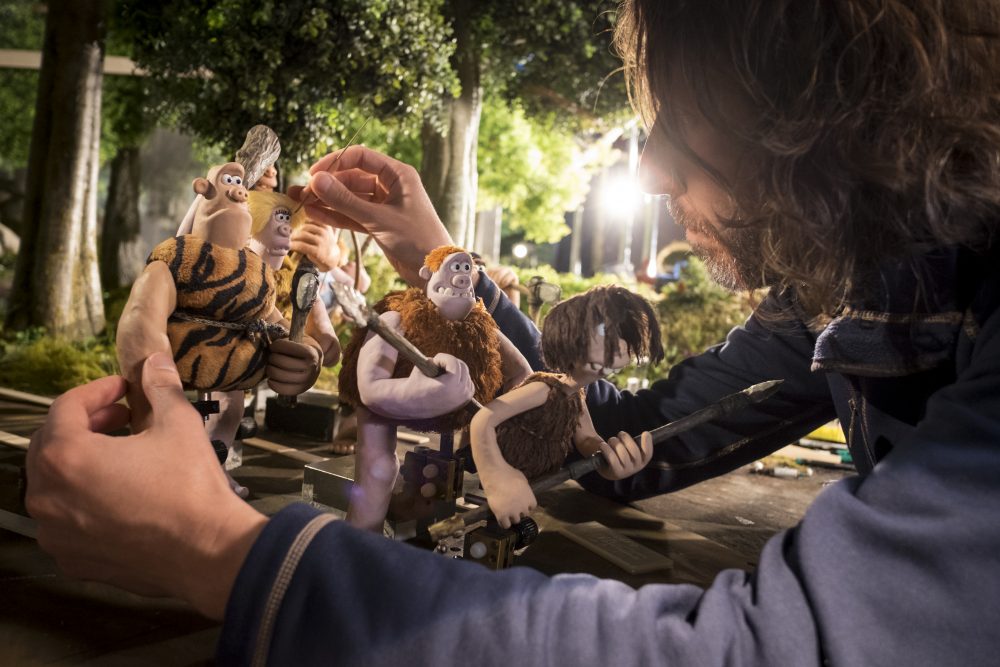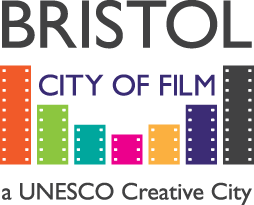Bristol: a globally celebrated City of Film
Since 2017, Bristol has been a UNESCO City of Film, one of 18 cities to hold this permanent global status recognising world-leading achievement in the field of film and the moving image. It is also a member of the UNESCO Creative Cities Network, more than 240 cities working together towards a common mission for cultural diversity and sustainable urban development. Bristol’s City of Film status enables the city to further embed the ethos of UNESCO and its Sustainable Development Goals (SDG’s) into its well-established moving image industry.

Photo by Bristol Post – Cary Grant revisiting Bristol
After a successful initial four years of the status that has seen Bristol’s filmmakers, festivals, educators and studios collaborate on a host of beneficial projects, the Bristol City of Film 2021-2025 Action Plan prioritises three main focus areas, carefully chosen to ensure ongoing sustainable development of Bristol’s film and TV sector:
1. SKILLS
Developing a dedicated skills and training programme for South Bristol; connecting new talent from the area to placements with productions working at The Bottle Yard Studios and on location
in Bristol; providing support and networks to support sustainable employment in the long term.
2. STORIES
Telling Bristol stories on film; celebrating diverse stories from across the city; maximising opportunities for screenings across Bristol neighborhoods; sharing Bristol-made films with fellow UNESCO Cities of Film and screening films from cities in countries such as India, Poland, Australia, South Korea, and Brazil in return.
3. SUSTAINABILITY
Promoting sustainable filming standards for productions working in Bristol; developing toolkits and working standards to meet Bristol’s aim to become carbon neutral by 2030; and working with partners to support business adaptation and share best practice.

In addition, Bristol City of Film is continually promoting successes from Bristol’s film and TV scene around the world, helping to drive the delivery of cultural activity as an enabler for sustainable development.
What makes Bristol a City of Film?
Film and the moving image has long been a central feature of Bristol’s cultural and commercial identity. From the origins of cinema in the 19th Century, when Bristolian inventor William Friese-Greene
(1855-1921) developed pioneering motion picture technology, to the golden age of Hollywood which saw Bristol-born Archie Leach (aka Cary Grant) become one of the world’s most famous and best-loved screen icons of all time, Bristol has a strong heritage in screen excellence.
Today, the city is home to world-leading media, including more than 130 production and postproduction companies. Oscar-winning Aardman Animations set up its studios in Bristol in the 1970s’s, gaining consistent success with titles including Wallace and Gromit, Chicken Run, Shaun the Sheep and Early Man. Since 2010 The Bottle Yard Studios, the largest film and television facility in the West of England, has attracted major productions to film in the city. The BBC produces internationally renowned drama, factual and wildlife television from its Bristol headquarters which house the broadcaster’s world-renowned Natural History Unit, and Channel 4 chose Bristol as the location for one of its creative hubs when it relocated out of London in 2019.
Bristol hosts 11 community-driven international festivals dedicated to film annually, including Wildscreen Festival, the world’s biggest festival of natural history storytelling and Encounters, the UK’s leading short film, animation and virtual reality festival. It is home to 10 cinemas including Watershed, the internationally renowned film culture and digital media centre that links many of Bristol’s festivals, networks and initiatives together whilst welcoming around 450,000 visitors a year. The city’s two major universities, the University of Bristol and the University of the West of England, are consistently rated in the top five establishments to study film-related courses in the UK, providing a total of 28 film-related degrees between them.

Photo by BFI Film Academy Bristol
Who are the 18 UNESCO Cities of Film?
- Bitola, North Macedonia Bradford, UK
- Bristol, UK
- Busan, South Korea Galway, Republic of Ireland Łódź, Poland
- Mumbai, India
- Potsdam, Germany Qingdao, China
- Rome, Italy
- Santos, Brazil
- Sarajevo, Bosnia & Herzegovina Sofia, Bulgaria
- Sydney, Australia
- Terrassa, Spain
- Valladolid, Spain
- Wellington, New Zealand Yamagata, Japan

Photo by STUDIOCANAL Behind the scenes of Early Man
Culture for Sustainable Development
“Culture is who we are and what shapes our identity. No development can be sustainable without including culture. In September 2015 the United Nations General Assembly adopted the ‘2030 Agenda for Sustainable Development’ with 17 ambitious, universal goals to transform our world.
“UNESCO ensures that the role of culture is recognised through a majority of the Sustainable Development Goals (SDGs), including those focusing on quality education, sustainable cities, the environment, economic growth, sustainable consumption and production patterns, peaceful and inclusive societies, gender equality and food security.
“From cultural heritage to cultural and creative industries, Culture is both an enabler and a driver of the economic, social and environmental dimensions of sustainable development. UNESCO’s work promoting cultural diversity, and UNESCO’s Culture Conventions, are key to the implementation of the 2030 Agenda for Sustainable Development.”

UNESCO Cities of Film map (Source – www.citiesoffilm.org)














